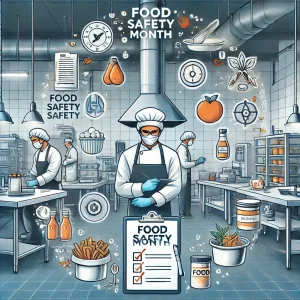
Food safety is a critical aspect of the food industry, with the potential to impact public health, brand reputation, and business success. Every year, Food Safety Education Month serves as a reminder of the importance of maintaining stringent food safety practices, raising awareness across the industry about the need for continuous vigilance and improvement.
Cravecrafted Snacks Company recognizes that ensuring the safety and quality of the food we handle is not just a regulatory requirement, but a core value that drives our operations, to enable us to fulfil our promise to our customers. We remain ever vigilant of the challenges and responsibilities that come with managing food safety.
Significance of Food Safety Education Month
First established in USA in1994, Food Safety Education Month is observed every September to promote safe food handling practices and to educate both industry professionals and consumers on how to prevent foodborne illnesses. The initiative is spearheaded by various food safety organizations and regulatory bodies, which collaborate to spread key messages about the importance of food safety across all stages of food production and consumption. September as Food Safety Education Month is primarily recognized in the United States. However, food safety is a global concern, and many countries have their own initiatives, awareness weeks, or campaigns dedicated to promoting food safety throughout the year.
As part of raising awareness for this worldwide issue, businesses are encouraged to review their food safety protocols, provide additional training to employees, and engage in public awareness campaigns. This time presents a valuable opportunity to solidify food safety practices, ensuring they are in line with industry standards. It is an opportunity to reflect on the practices in place, assess their effectiveness, and identify areas for improvement. It’s also a chance to contribute to the broader conversation about food safety, sharing experiences and learning from others in the industry.
Food Safety Challenges
Small scale businesses in the food industry face unique challenges when it comes to ensuring food safety. Limited resources, the need to establish supply chains, smaller budgets for employee training and the pressure to scale quickly can sometimes lead to lapses in safety protocols if not carefully managed. However, these challenges also present opportunities for innovation and the development of robust systems that can scale with the business.
Addressing these challenges requires a proactive approach, with a focus on building strong foundations in food safety that will support future growth. Cravecafted Snacks Company has prioritized food safety from day one, recognizing that any lapses could have serious consequences for both our customers and our business.
Food Safety Protocol
Businesses in the food industry need to devise a comprehensive food safety program designed to meet industry standards and even exceed customer expectations! These protocols should cover every aspect of operations, ensuring that food safety is maintained at all stages of production and handling:
- Sourcing Ingredients
It is a good idea to work only with suppliers who have demonstrated a commitment to food safety, requiring them to provide certification of their practices. Regular audits need to be conducted to ensure that business partners continue to meet strict quality standards.
- Handling and Storage Practices
Facilities must be equipped with storage systems that maintain optimal temperatures and humidity levels for all products. Following first-in, first-out (FIFO) inventory system can minimize the risk of using expired ingredients or materials past their prime.
- Cleanliness and Hygiene Standards
Maintaining a clean and sanitary environment must remain a top priority at all times. Implementing cleaning schedules, with all surfaces and equipment sanitized regularly throughout the day is a good way to ensure that. Employees should be required to follow strict personal hygiene protocols, including regular hand washing and wearing protective clothing.
- Employee Training Programs
Investing in comprehensive food safety training for employees as part of their onboarding process, with regular refresher courses provided throughout the year will pay off with high levels of food safety standards. Training can cover topics such as cross-contamination prevention, proper food handling techniques, and emergency procedures in case of contamination.
- Regular Inspections and Audits
To ensure compliance with food safety protocols, regular internal inspections and audits must be supplemented by third-party inspections to provide an additional layer of accountability and credibility.
- Leverage Technology
Use food safety software and other tools to track and manage food safety practices efficiently. Traceability is enhanced by utilizing barcodes and RFID tags; barcode systems in inventory management can better monitor stock levels, expiry dates, and batch tracking; blockchain technology can provide an immutable record of transactions across the supply chain and implementing a food safety management software that centralizes data from different processes makes it easier to track compliance, inspections, and audits. Not just this, but data combined with predictive analytics can help foresee potential issues before they arise, allowing for proactive management of food safety.
Participating in food safety awareness activities can also provide valuable insights and resources to strengthen your organization’s food safety practices.
Conclusion
Food safety should not just be a regulatory requirement – it has to be a cornerstone of a food business’s operations! As we observe Food Safety Education Month, we remain committed to maintaining the highest food safety standards and encourage others in the industry to do the same.

Post Comments